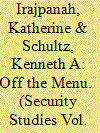|
|
|
Sort Order |
|
|
|
Items / Page
|
|
|
|
|
|
|
| Srl | Item |
| 1 |
ID:
182702


|
|
|
|
|
| Summary/Abstract |
What motivates Chinese media campaigns during foreign policy disputes, and how are they carried out? “Influence campaigns” are often recognized as highly pertinent to international security, yet they remain understudied. This article develops and tests a theory that explains these media campaigns as strategic actions to align domestic public opinion when it deviates from the state’s preferred foreign policy, exploiting the media’s mobilization or pacification effect. These divergent media effects correspond to two types of media campaigns, respectively—mobilization campaigns and pacification campaigns. The pacification campaigns are particularly important because they indicate that hawkish rhetoric may counterintuitively pacify the public, and hence its adoption implies a moderate foreign policy intent. A medium-N congruence test of 21 Chinese diplomatic crises and process tracing of the 2016 Sino-Philippines arbitration case offer strong support for the theory and demonstrate how a pacification campaign works and how it differs from a mobilization campaign.
|
|
|
|
|
|
|
|
|
|
|
|
|
|
|
|
| 2 |
ID:
182705


|
|
|
|
|
| Summary/Abstract |
Many armed groups create informal institutions to maintain social order during conflict. The remnants of these informal institutions form a key challenge for governments in postconflict societies in their attempts to reestablish themselves as credible state authorities. The persistence of paramilitary groups’ informal “justice” systems in the form of so-called punishment attacks in Northern Ireland, more than twenty years on from the Good Friday Agreement, offers insights into the legacy of wartime institutions. We argue that armed actors can benefit from the social control wartime institutions grant them long after the conflict ends and both armed actors and civilians are socialized into relying on these institutions. Building on research on wartime institutions, criminal governance, and postwar state-building, we examine how the informal “justice” systems created during the Troubles (1968–98) remain at the fringes of postwar society, drawing on historical works, interviews with stakeholders, geocoded data on “punishment attacks,” and survey data.
|
|
|
|
|
|
|
|
|
|
|
|
|
|
|
|
| 3 |
ID:
182703


|
|
|
|
|
| Summary/Abstract |
The claim that President Donald Trump’s “fire and fury” pressure campaign coerced North Korea to return to the bargaining table has renewed debates about coercion among nuclear powers. This article contributes to these debates by refining our understanding of the 1969 Sino-Soviet border crisis. Drawing on Romanian archival documents and Chinese-language sources, this article challenges the assertion that Soviet nuclear threats coerced the Chinese to return to the bargaining table. Further, it explains China’s otherwise puzzling intransigence when border negotiations resumed. After China’s leaders agreed to return to the bargaining table, they became fearful of a Soviet nuclear attack and fled Beijing; despite this fear, however, the Chinese resisted a border deal for decades. Why did the fear of a Soviet nuclear attack fail to compel the Chinese to accept a border deal? By improving our understanding of the 1969 crisis, this article sheds new light on the conditions under which nuclear compellence succeeds.
|
|
|
|
|
|
|
|
|
|
|
|
|
|
|
|
| 4 |
ID:
182701


|
|
|
|
|
| Summary/Abstract |
Why do states no longer declare war? In a provocative analysis, Tanisha M. Fazal argues that states stopped declaring war to evade the costs of complying with the growing body of international humanitarian laws. We argue instead that post-1945 normative and legal developments that sought to prohibit war changed the meaning of war declarations in a way that made them at best irrelevant and at worst counterproductive. Although war-making did not end, a once routine feature of warfare came to be seen as a signal of extreme aims that could complicate escalation management and coalition building. Moreover, the United Nations (UN) system provided more desirable ways for states to justify military operations, particularly through self-defense claims. We support this argument through a reassessment of the empirical pattern of war declarations, an analysis of self-defense claims made under Article 51 of the UN Charter, and case studies of undeclared wars in the post-1945 period.
|
|
|
|
|
|
|
|
|
|
|
|
|
|
|
|
| 5 |
ID:
182704


|
|
|
|
|
| Summary/Abstract |
What explains the rise of maritime private military security companies (PMSCs)? How do they differ from land-based PMSCs? I argue that PMSCs have become major providers of security at sea. Yet maritime PMSCs are not hired by states but by the maritime industry. The United States and allied forces do not guarantee merchant vessels’ day-to-day security. Consequently, shipowners rely on PMSCs and war and piracy insurance to operate their vessels in dangerous waters. The United States, however, plays a vital role in regulating PMSCs and creating environments in which PMSCs can operate effectively. This paper shows that order at sea depends not on the United States’ “hard” naval power but on its leadership in global governance and on its ability to create rules and norms for maritime behavior. It also shows that PMSCs can help secure the oceans if regulated and supported by state authorities. I illustrate this logic through three case studies of how the United States has facilitated private security efforts: during the Iran–Iraq Tanker War, in piracy-prone shipping lanes off Somalia, and in the Persian Gulf following attacks there in 2019.
|
|
|
|
|
|
|
|
|
|
|
|
|
|
|
|
|
|
|
|
|